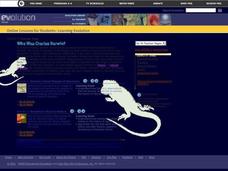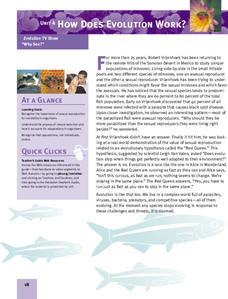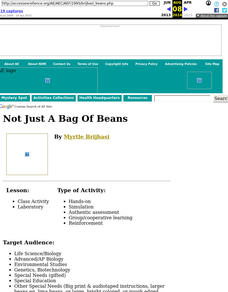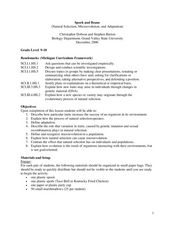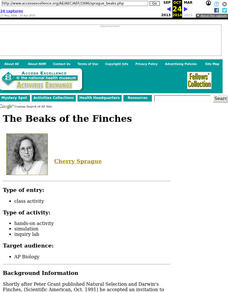California Academy of Science
Color Vision Genetics Evolution Simulation
At one point, all mammals carried only two color receptors, but now most humans carry three. An informative presentation and hands-on activity demonstrate how this evolved through genetics. By participating in the activity, pupils...
Curated OER
Who Was Charles Darwin?
High schoolers complete two activities to study Charles Darwin's Theory of Natural Selection. They read Darwin's journal from the voyage of the Beagle and look at the scientific ideas that influenced the development of his theory.
Curated OER
Diversity/Natural Selection
High schoolers examine mechanisms behind biological evolution and the theories that feed it, and are able to demonstrate their knowledge of these theories in a story.
Curated OER
How Does Evolution Work?
Students pretend they are a scientist like John Endler in this Web activity. They visit his pools, from hypotheses, and test them out. In the process, the explore about natural selection and sexual selection. They are able to explain the...
Curated OER
Roots: The Ancestry of Modern People
High schoolers investigate the models for the origin of modern humans and the conditions that facilitate speciation and evolution. The classification and nomenclature of hominid species is also examined.
Curated OER
Evolution of Life
Students explore the evolution of life. They read sections of their text and make a foldable of the key vocabulary terms. They identify two types of butterflies and represent their similarities and differences on a Venn diagram. They...
Curated OER
How Evolution Works
Students examine the term natural selection and what behavioral adaptations are. In this evolution lesson students view videos about evolution and perform experiments that simulate populations that interplay between the forces of...
Curated OER
How Evolution Works
High schoolers discuss the evolution of the eye and how a complex organ can evolve through natural selection. They research genetic variation, adaptation, and sexual selection. They analyze data to determine how beak length of Gal??pagos...
Curated OER
Survival of the Sneakiest
In this natural selection worksheet, students read a cartoon about cricket mating that explains natural selection, fitness and evolution. They answer four questions about each of these topics.
Curated OER
How Does Evolution Work?
Middle schoolers are introduced to how the process of evolution works. As a class, they review the characteristics of natural selection and how those with advantageous traits reproduce and survive. To test this theory of natural...
Curated OER
Not Just a Bag of Beans
Learners determine the types of natural selection and variation that exists in a population, using beans.
Curated OER
Applied Evolution: How Will We Get There from Here?
Students explore the basic process of natural selection and how people can manipulate that process today. The consequences of natural selection on daily life and the implications of evolutionary biology in basic and applied science is...
Curated OER
The Theory of Evolution
In this theory of evolution worksheet, students will review the role Charles Darwin played in the theory of evolution, natural selection, and adaptations. Students will explore some of the different types of evidence for the theory of...
Curated OER
Evolution Concept Map
In this biology worksheet, students complete a concept mp on the theory of evolution by natural selection. They fill in 8 blanks with the correct terms from the list.
Curated OER
Survival of the Fittest – Battling Beetles
Students explore natural selection. For this genetic adaptation lesson plan, students discover why certain traits continue and some traits disappear. Students discover how species evolve and change. Resources are provided.
Curated OER
The Rise and Fall of the Mammoths
Students develop an understanding of the evolution of species in the context of the woolly mammoth. They examine the fossil record to explain natural selection.
Curated OER
Spork and Beans
Students examine natural selection, how it works and how it can cause microevolution. In this evolution lesson students complete a lab activity that shows the effects that natural selection has on organisms.
Curated OER
The Great Jellybean Hunt
Students model natural selection by acting as predators of jellybeans. In this evolution lesson plan, students use plastic utensils to pick up jellybeans. They use different colors of backgrounds to demonstrate the effects of camouflage...
Curated OER
Lamarck And Darwin
Students compare Lamarck's mechanism for evolution with Darwin's theory of natural selection.
Curated OER
The Beaks of the Finches
Students become birds and are given "beak-types". After completing the simulation, students relate results to adaptations and natural selection. Extensions of the simulation allow for comparative results and include population genetics.
Biology Junction
Lamarck vs. Darwin: Introduction to Change in Organisms
How are traits passed down from parents? Jean Baptiste Lamarck and Charles Darwin envisioned conflicting theories. Learn about both scientists and their theories with an insightful presentation. Giraffes and dogs serve as examples of...
Howard Hughes Medical Institute
Look Who's Coming for Dinner: Selection by Predation
What happens when a new predator comes to town? Learners analyze an experiment that studies the effect of predation on selection. They use real data to draw conclusions about the impact a new predator has on a prey species.
Curated OER
The Origin of Life: Alternative Views
Students explore the topics of faith and science as they relate to the origins of life. They consider the major points of Darwin's Theory of Evolution and brainstorm various explanations of how life began. Students investigate different...
Howard Hughes Medical Institute
Got Lactase? The Co-Evolution of Genes and Culture
Does the human body evolve as quickly as human culture? With a stellar 15-minute video, explore the trait of lactose intolerance. Only about 1/3 of human adults seem to still have the enzyme lactase and therefore, the ability to digest...



